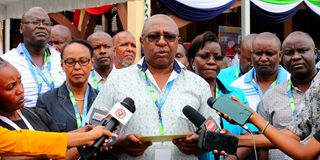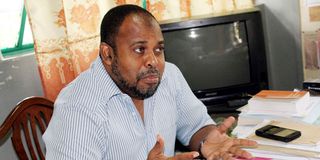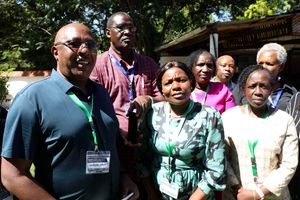
Kenya Secondary Schools Heads Association Chairperson Willy Kuria addresses the media in Mombasa on June 25, 2024
When the bell rings at 4pm to mark the end of school day, learners burst out of classrooms with laughter and chatter, eager to head home; teachers put away their books and walk toward the gates, relieved that another demanding day is over. Slowly, the compound grows quiet – except for one room where lights are often on when the sun sets. The principal’s office.
Being a secondary school principal is turning out to be one of the most stressful jobs in the country. Principals who spoke to Sunday Nation told of being caught up in the acute horns of a dilemma between expectations to deliver excellent results in national examinations and inadequate resources from the government. Others talked of political interference in the running of schools.
As the second week of the second term comes to an end, schools are yet to receive the second tranche of capitation funds. The national chair of the Kenya Secondary Schools Heads Association (Kessha) Willy Kuria said that there is low motivation among his colleagues, especially those deployed to day schools owing to inadequate funding and delays to disburse capitation to schools.

Kenya Secondary Schools Heads Association national chairman Willy Kuria.
“We have a balance of about Sh2,800 per student which not remitted from last term and some schools have had to close without paying salaries for non-teaching staff. Suppliers are on our necks and they no longer trust schools anymore. We have to play hide-and-seek and at times instruct the guards at the gate not to let them come into the school. We’ve ended up living a dishonest life,” Mr Kuria told Sunday Nation.
He said that the situation became worse from 2017 when the government declared the Free Day Secondary Education (FDSE) but financing has been inconsistent. Before then, there was cost-sharing where even learners in day schools would pay Sh9,000 while the government sent Sh12,000 to cater for tuition expenses.
Under the programme, each learner is entitled to Sh22,244 annually for tuition but over the years, the government has been sending about Sh17,000. Recently, the Cabinet Secretary for National Treasury and Economic Planning John Mbadi said the government will not pay the outstanding amount, which Kessha says amounts to Sh64 billion.

John Mbadi the Cabinet Secretary for National Treasury and Economic Planning.
“If the government delays to disburse the money, principals would use what the parents paid but right now, there is nothing. Day schools, which are attended by 70 per cent of secondary school learners, are worst hit and this is reflected in their academic performance. There’s no motivation among workers who are not paid, low output and principals don’t want to be posted to those schools,” said Mr Kuria.
He said that principals of boarding schools utilise the boarding fees parents pay as they wait for the government capitation to be disbursed.
Mr Kuria added that principals have to make decisions on the co-curricular activities the learners take part in and leave out others due to lack of resources. He said that it is a delicate balance since the learners at times demand to participate and if denied, it can lead to unrest.
“Being a principal in this country is not easy. The pressures are enormous, political interference is one of our biggest challenges. Leaders push for certain appointments not based on merit, but tribal or political affiliations, and when you don’t do what they want, they start threatening you,” he said.
Another major challenge is the chronic shortage of teachers, which is compounded by increasing student enrollment driven by the government’s 100 percent transition policy.
Offer bribes
“Parents expect good results, but how can we deliver when there aren’t enough hands on deck? And worse still, some parents try to manipulate outcomes. They offer bribes during national examinations or pressure teachers to compromise the integrity of exams. Some of us have caved under the pressure – not because we want to, but because the system itself breeds corruption,” one principal said.
A principal of a school in Eldoret said the Ministry of Education recently directed schools to deduct Sh1,500 per learner from the allocated funds for infrastructure development.
“This is money meant to run the school, to buy chalk, stationery and pay utility bills. Now they want us to build from it? I have 1,500 students. That’s Sh2.25 million deducted from an already insufficient budget. It’s torture,” he said.
Despite numerous calls from education stakeholders for appointments based on competence, experience, and diversity, many principals feel trapped in a system still deeply rooted in ethnic and political favouritism. The merit of one’s work often takes a back seat to identity politics.
“You’re judged not on your performance, but on where you come from,” the principal added. “They tell you, ‘You’re not the son of this soil.’ It’s disheartening.”
An unhealthy culture of school rivalry further fuels the pressure for results. Principals complained of parents who compare schools solely by performance in national examinations while ignoring the disparities in resources, teacher-student ratios, or infrastructure.
“Parents come to your office demanding performance, but without any understanding of what you’re dealing with behind the scenes. You try to explain, but they don’t listen they only want results,” the principal said. There have been public incidents of humiliation of principals frog marched from schools by angry parents after poor performance in national exams.
Debt of Sh30 million
“My school currently has a debt of Sh30 million. When I took over, it was Sh68 million. I’ve done everything possible to reduce it, but the burden is crushing. Suppliers come knocking every week. Parents are demanding,” a principal of a school in Nairobi explained.
Faced with inadequate funding, minimal staffing, and little political goodwill, principals say they’re being set up to fail.

Delegates attend the 47th Kenya Secondary Schools Heads Association Conference at the Sheikh Khalifa Bin Zayed Hall in Mombasa on June 24, 2024.
“We’re expected to perform miracles with empty pockets, skeletal staff, and relentless scrutiny. But we’re human. How long can we go on like this? I am exhausted. We are running schools on hope and prayers. This is not sustainable,” another principal said.
With over 1,600 students under his care, the principal painted a grim picture of strained resources, rising debts, and a government capitation promise that remains unfulfilled.
“The other day I sent some students home, although the government says we shouldn’t send children home for school fees. How are we principals expected to survive? There is no money,” he said.
“We are owed millions [by the government]. I’m drowning in debt. One of the creditors even threatened to take me to court. When I take this to the Board of Management, they ask: ‘Where is the money?’ But I don’t have it,” the visibly frustrated principal said.
The head teachers also disapproved of constant threats by education officials about violation of set fee guidelines questioning how they are expected to run schools without some of these levies. Some say the pressure for performance from parents is the reason behind the fees quietly charged on parents under an item by diverse names like ‘motivation fees,’ and ‘motisha’ to pay teachers to offer more lessons outside the official school time.
The chair of the Kenya Primary School Heads Association (Kepsha) Fuad Ali confirmed that primary and junior schools have also not received the second term tranche.

Kenya Primary School Heads Association chairperson Fuad Ali.
“We have not yet received the capitation. But we already had a discussion with the Ministry of Education, and they informed us that we should expect the funds anytime during the course of this week,” he told Nation earlier in the week.
“Right now, we are operating on expectations, we’re planning while waiting for funds. But if the capitation comes within the week, we will not be too badly off. If it delays further, then we’ll start experiencing challenges,” he added.
He noted that during first term, some schools were underfunded due to discrepancies in the National Education Management Information System (Nemis).
“In the first term, we closed the chapter. However, there were some issues with Nemis, where some schools were underfunded because of data mismatches,” he explained. “But we held a meeting with the Ministry, and they assured us they are correcting and upgrading the Nemis system.”
He added that once the Nemis system is fully updated, schools should expect accurate disbursement.
On the amount allocated per learner, he confirmed that the primary school capitation remains unchanged since 2003 despite a recommendation to do so by the Presidential Working Party on Education Reforms.
“The capitation for primary schools is still at Sh1,420 per learner. That has not changed yet, however, we are in consultation with the Ministry to have it increased to match the current market rates,” he said.








